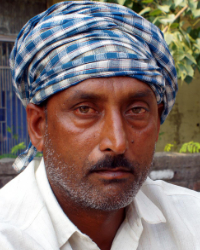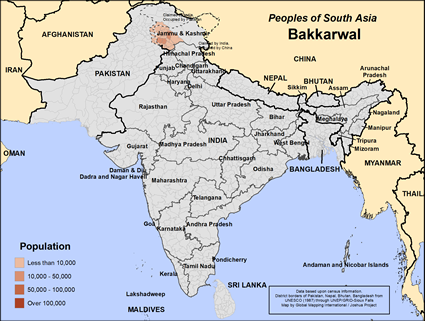Bakkarwal in India

Photo Source:
Copyrighted © 2026
Isudas All rights reserved. Used with permission |

Map Source:
People Group data: Omid. Map geography: UNESCO / GMI. Map Design: Joshua Project.
|
| People Name: | Bakkarwal |
| Country: | India |
| 10/40 Window: | Yes |
| Population: | 114,000 |
| World Population: | 114,000 |
| Primary Language: | Gujari |
| Primary Religion: | Islam |
| Christian Adherents: | 0.05 % |
| Evangelicals: | 0.00 % |
| Scripture: | Portions |
| Ministry Resources: | No |
| Jesus Film: | No |
| Audio Recordings: | Yes |
| People Cluster: | South Asia Tribal - other |
| Affinity Bloc: | South Asian Peoples |
| Progress Level: |
|
Introduction / History
Most likely the name Bakkarwal is derived from the word bakriwale, meaning goat herders, or goat, cattle or sheep producers.
The Muslim Bakkarwal (also Bakarwal) people live in the northern Indian provinces of Jammu and Kashmir. The two most spoken languages among the Bakkarwal are Gujari and Kashmiri. Some audio Scriptures and Bible portions are available in both languages. A tiny fraction of the Bakkarwal claim to be followers of Jesus Christ.
What Are Their Lives Like?
Violence and unrest are common in the region where the Bakkarwal live. Muslim groups fight among themselves and against the Indian government.
The Bakkarwal have permanent homes but move from one altitude to another in search of green pasture and water for their goats, cattle and sheep. The identification marker of the Bakarwal males is their turban, called dastar. The women, too, wear a special cap, called the topi. They bury their dead and perform special ceremonies on the fourth and fortieth days after death.
Their main occupation is animal husbandry, taking care of goats, sheep and cattle. Men take goats skins and make them into tents. Men produce leather products from the cattle. Women use wool to weave rugs and clothing. The Bakkarwal trade meat, dairy products, wool, leather and goat skins for things they cannot make for themselves such as cell phones and appliances.
Village elders make judicial decisions and enforce caste norms. A man can have up to four wives if he can afford them. The norm is one wife. Bakkarwal tend to have large families as children are viewed as blessings from Allah. The Bakkarwal marry among their group. Families and young people arrange weddings. Sons inherit their father's property. It is the sons' responsibility to take care of elderly parents. Children frequently quit school after a few years to help their family earn a living. Some Bakkarwal young people are leaving their traditional way of life and moving to Indian cities in search of a better life. In rural areas Bakkarwal often lack access to modern medicine and clean water. Life expectancy is low and child mortality is high. Many Bakkarwal, especially their women, are unable to read and write. The nomadic lifestyle of the Bakkarwal makes it difficult for their children to attend school.
What Are Their Beliefs?
Almost all Bakkarwal people are Sunni Muslims. Sunni Bakkarwal believe that the supreme God, Allah, spoke through his prophet, Mohammed, and taught mankind how to live a righteous life through the Koran and the Hadith. To live a righteous life, you must utter the Shahada (a statement of faith), pray five times a day facing Mecca, fast from sunup to sundown during the month of Ramadan, give alms to the poor, and make a pilgrimage to Mecca if you have the means. Muslims are prohibited from drinking alcohol, eating pork, gambling, stealing, slandering, and making idols. They gather for corporate prayer on Friday afternoons at a mosque, their place of worship.
The two main holidays for Sunni Muslims are Eid al Fitr, the breaking of the monthly fast and Eid al Adha, the celebration of Abraham's willingness to sacrifice his son to Allah.
Sunni religious practices are staid and simple. They believe that Allah has pre-determined our fates; they minimize free will.
In most of the Muslim world, people depend on the spirit world for their daily needs since they regard Allah as too distant. Allah may determine their eternal salvation, but the spirits determine how well we live in our daily lives. For that reason, they must appease the spirits. They often use charms and amulets to help them with spiritual forces.
What Are Their Needs?
Bakkarwal people need new job skills. They need good schools for their children. They would benefit from modern medicine and clean water. Like all other peoples of the world, this people group desperately needs the blessings and guidance that only Jesus Christ can offer.
Prayer Points
Ask God to help the tiny number of Bakkarwal believers to find fellowship and grow in the faith.
Ask God to send loving, committed workers to the Bakarwal.
Pray that Bakkaral children may be able to attend school and gain literacy skills.
Pray for a spiritual hunger among Bakkarwal leaders.
Pray that God raises up a growing Bakkarwal church in this decade.